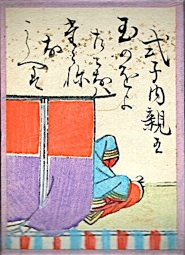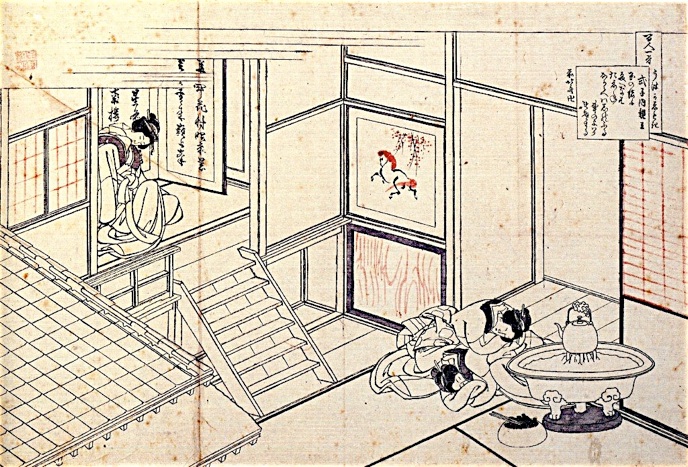式子内親王

玉の緒よ
絶えなば絶えね
ながらへば
忍ぶることの
よわりもぞする
しょくしないしんのう
たまのおよ
たえなばたえね
ながらえば
しのぶることの
よわりもぞする
Princess Shokushi
If like a string of pearls
As tears breaking and draining
My life floats on,
My yearning too
May end up shattered.
Hokusai
Princess Shokushi (1149 - 1201), also called Shikishi Naishinno (imperial princess), was the daughter of emperor GoShirakawa and through her mother, Takakura Sanmi Seishi, related to several other poets in this anthology. She became the Kamo shrine priestess at Ise in 1159. There are 157 poems of her extant. She studied poetry with Fujiwara no Toshinari (poem 83) who wrote for her the Korai Futei Sho, a treatise on poetics. Shokushi met the younger Teika (poem 97) and it is rumoured they had a love affair according to a No play called Teika by Zenchiku from the 1400s. The Hogen Rebellion, which was actually a civil war, took place when she was still young.
Tama can mean ‘jewel, pearl, dew or tears’. Nagaru is ‘to flow, to fall, to drain’ like tears or ‘to live long’. So the intertwined meanings are: pearls breaking, tears flowing, life floating on. Shinobu has the meanings ‘endure, hide, long for’.
My translation is a very daring one and I am sure not everyone will agree with it. But the original is, indeed, a very powerful poem.
The drawing by Hokusai seems to suggest a lady waiting for her lover and dozing off, like both servants. A delicate suggestion of the slow slipping away of our time and life? The picture of the lively horse could serve as a contrast.


